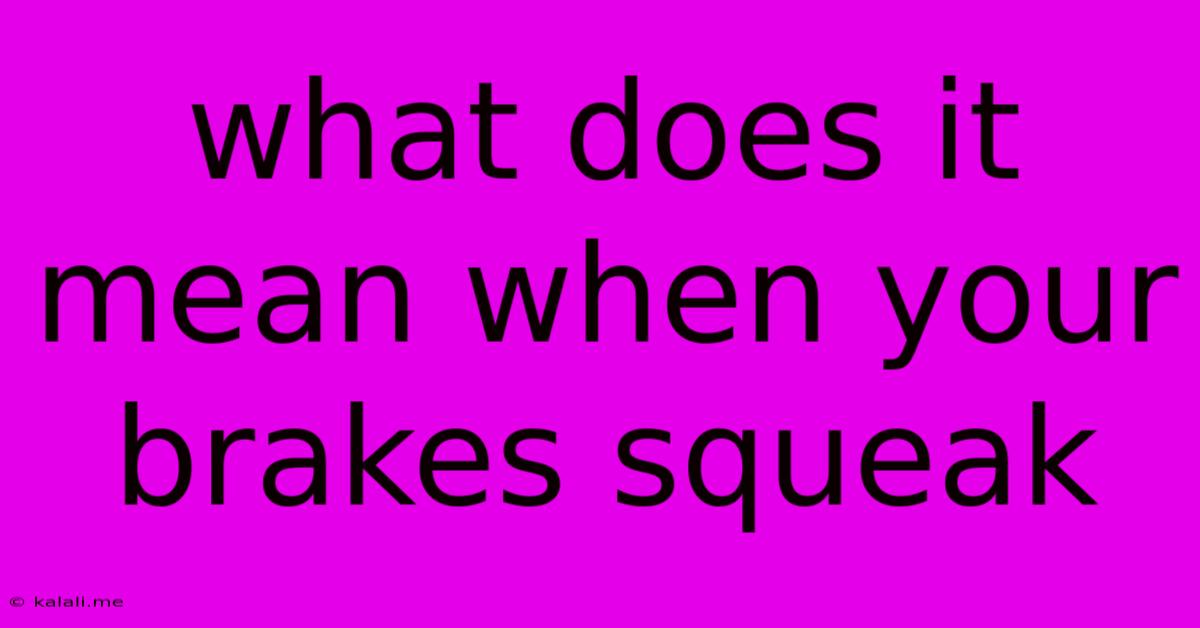What Does It Mean When Your Brakes Squeak
Kalali
Jun 02, 2025 · 3 min read

Table of Contents
What Does it Mean When Your Brakes Squeak? A Comprehensive Guide
Brakes are arguably the most crucial safety feature in your car. A squeaking sound coming from your brakes shouldn't be ignored. It's a clear sign that something isn't right and needs attention. This comprehensive guide will explore the various reasons why your brakes might squeak, helping you understand the severity of the issue and what steps you should take.
Common Causes of Brake Squeaking
Several factors can contribute to brake squealing. Understanding these causes is the first step towards addressing the problem.
1. Worn Brake Pads: This is the most common cause of brake squealing. As brake pads wear down, the metal backing plate can come into contact with the rotor, creating a high-pitched squeal. This is often accompanied by a noticeable decrease in braking performance. You might also notice a grinding noise if the pads are severely worn.
2. Contamination: Dust, grease, or other contaminants on the brake rotor or pad surfaces can cause squeaking. This is particularly common after brake work, if proper cleaning wasn't performed.
3. Brake Pad Material: The material composition of your brake pads plays a role. Some brake pad materials are simply more prone to squealing than others. This is often a design characteristic and not necessarily an indication of a problem.
4. Moisture: Water or other moisture can get between the brake pad and rotor, leading to temporary squealing, especially after driving in wet conditions. This usually resolves itself after a short period of driving.
5. Loose or Damaged Brake Components: A loose caliper, worn caliper pins, or other damaged brake components can cause vibrations and squealing sounds. This is a more serious issue that requires immediate professional attention.
6. Corrosion: Rust or corrosion on brake components can also generate squeaking noises. Regular maintenance and cleaning can help to mitigate this.
Differentiating Squeaks: Severity and Next Steps
The sound of your squeaking brakes can offer clues about the underlying problem.
- High-pitched, persistent squeal: This often indicates worn brake pads and requires immediate attention. Ignoring this could lead to rotor damage.
- Intermittent squeal: This could be due to moisture, contamination, or less serious issues. Observe the frequency and context of the squeal to determine whether further action is needed.
- Squeal accompanied by grinding or other unusual noises: This is a serious issue that requires immediate professional inspection. It could indicate severe brake pad wear, rotor damage, or a problem with other brake components.
- Squeal only when braking gently: This might point to less severe issues like pad material or contamination.
When to See a Mechanic
While some squealing might be minor, it's always best to err on the side of caution. Schedule a professional brake inspection if:
- The squealing is persistent and high-pitched.
- The squealing is accompanied by other unusual noises, such as grinding or vibrations.
- You notice a decrease in braking performance.
- You're unsure of the cause of the squealing.
Regular brake inspections as part of your routine car maintenance are essential for preventing serious problems and ensuring your safety on the road. Ignoring brake squealing could lead to costly repairs and compromise your safety. Don't delay – address the issue promptly.
Latest Posts
Latest Posts
-
Append To String Variable Replaces Value Power Automate
Jun 04, 2025
-
Portable A C Vent Hose To Wall Port Reducer
Jun 04, 2025
-
Which Is The Parent In A Many To Many Relation
Jun 04, 2025
-
What Transfer Network To Use For Retik To Metamask
Jun 04, 2025
-
How To Make Borderlands 2 Full Screen Mac
Jun 04, 2025
Related Post
Thank you for visiting our website which covers about What Does It Mean When Your Brakes Squeak . We hope the information provided has been useful to you. Feel free to contact us if you have any questions or need further assistance. See you next time and don't miss to bookmark.